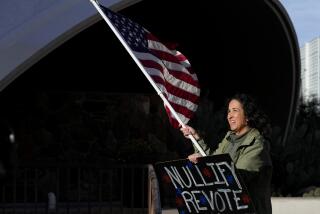No Newsletter Prosecution : Lehner Valley Residents Fume Over D.A. Decision
- Share via
It seems to the disgruntled residents of Lehner Valley that all’s fair in not only love and war, but also in politics.
Their reaction was shock and disbelief when informed this week that the San Diego County district attorney’s office has dropped an investigation of possible fraud in an Escondido annexation election, ruling that there are “no applicable statutes” that prohibit annexation proponents from distributing bogus editions of an anti-annexation newspaper.
The district attorney’s decision not to file charges in the case followed a decision last month by the U. S. attorney’s office that a political dirty trick by annexation advocates did not qualify for prosecution under federal mail fraud statutes.
Will Map Out Action
Escondido attorney Roy Garrett, who has been representing the annexation opponents in other legal matters, was angry at the decision by Assistant Dist. Atty. Allan Preckel not to pursue the case.
“When people attempt to steal an election by obvious fraud, and no criminal intent is found, that leaves it up to private individuals to try to enforce the law and protect their rights,” Garrett said. He said the anti-annexation forces will meet soon, probably next week, to map out their course of action.
The election incident involved a copy of the Lehner Valley News, a publication put out by and for residents of the rural valley north and east of Escondido who oppose annexation to the city.
On June 4, just before the June 7 annexation election, a phony edition of the Lehner Valley News was mailed to the 200 or so residents of the valley. The headlines and stories in the bogus newsletter reported that the anti-annexation forces had changed their collective minds and now supported the annexation to Escondido.
A marathon telephone campaign countered the impact of the phony headlines, and the annexation failed by a 95-75 vote.
After the election, anti-annexation activist Wanda Cavanaugh traced the bogus mailing through its postage meter number to Thunderboats Unlimited, headed by John Daley, president of San Diego-based Daley Corp. and one of the owners of the 3,200-acre Daley Ranch next to Lehner Valley. Daley Ranch officials and Ed C. Malone, another property owner in Lehner Valley, had been highly visible supporters of the annexation.
“It’s sad what they are doing to our election system,” Cavanaugh said after she was informed that no criminal charges will be brought against the perpetrators of the political dirty trick. “I’m mad as hell and hope we can do something about it. But I don’t know yet what can be done. The average Joe out here doesn’t seem to care about anything except football games and their beer in the evening.”
However, Cavanaugh said: “I’ve come to believe that someday, somehow, there will be a reckoning. Maybe it will be months or even years from now, but I believe there will be justice done. People just can’t go around treading on the rights of the little people.”
Gregory Quist, editor and publisher of the legitimate Lehner Valley News, is as miffed as Cavanaugh at the lack of government action in what he considers an election fraud. But he isn’t as willing to wait for justice to be done. He is investigating methods of filing a complaint with the state Fair Political Practices Commission against the forces that put out the bogus paper.
Quist, who also authors much of the copy in the genuine Lehner Valley News, acknowledges that he erred in not copyrighting his twice-monthly publication, because “I’m not a lawyer, but I think we might have had a good case against them if I had.”
FPPC media director Sandra Michioku isn’t sure the agency has much say in the case. But, if the pro-annexation forces spent more than $1,000 in promoting their cause or sent out more than 200 copies, they may have violated the state Political Reform Act by failing to register with the secretary of state or by neglecting to list campaign donations and expenses with the county registrar of voters, she said.
Attorney Albert Shelden of the state attorney general’s office also questioned whether the fake Lehner Valley News violated state election laws.
But most political literature, fake or not, has been protected by the courts under the First Amendment rights of free speech, he said. “It’s pretty much anything goes in an election.”
More to Read
Sign up for Essential California
The most important California stories and recommendations in your inbox every morning.
You may occasionally receive promotional content from the Los Angeles Times.













